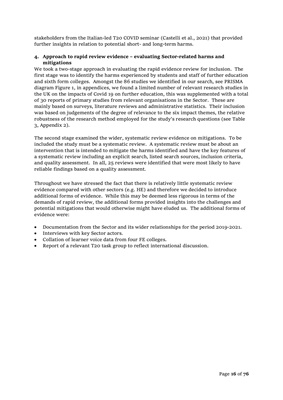
Page 16 of 76
stakeholders from the Italian-led T20 COVID seminar (Castelli et al., 2021) that provided
further insights in relation to potential short- and long-term harms.
4. Approach to rapid review evidence - evaluating Sector-related harms and
mitigations
We took a two-stage approach in evaluating the rapid evidence review for inclusion. The
first stage was to identify the harms experienced by students and staff of further education
and sixth form colleges. Amongst the 86 studies we identified in our search, see PRISMA
diagram Figure 1, in appendices, we found a limited number of relevant research studies in
the UK on the impacts of Covid 19 on further education, this was supplemented with a total
of 30 reports of primary studies from relevant organisations in the Sector. These are
mainly based on surveys, literature reviews and administrative statistics. Their inclusion
was based on judgements of the degree of relevance to the six impact themes, the relative
robustness of the research method employed for the study's research questions (see Table
3, Appendix 2).
The second stage examined the wider, systematic review evidence on mitigations. To be
included the study must be a systematic review. A systematic review must be about an
intervention that is intended to mitigate the harms identified and have the key features of
a systematic review including an explicit search, listed search sources, inclusion criteria,
and quality assessment. In all, 25 reviews were identified that were most likely to have
reliable findings based on a quality assessment.
Throughout we have stressed the fact that there is relatively little systematic review
evidence compared with other sectors (e.g. HE) and therefore we decided to introduce
additional forms of evidence. While this may be deemed less rigorous in terms of the
demands of rapid review, the additional forms provided insights into the challenges and
potential mitigations that would otherwise might have eluded us. The additional forms of
evidence were:
• Documentation from the Sector and its wider relationships for the period 2019-2021.
• Interviews with key Sector actors.
• Collation of learner voice data from four FE colleges.
• Report of a relevant T20 task group to reflect international discussion.